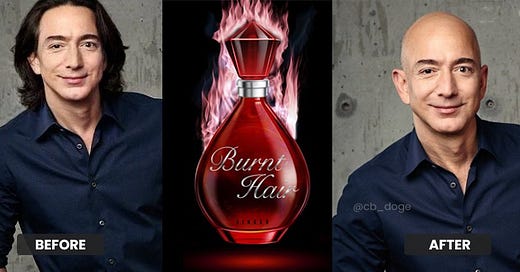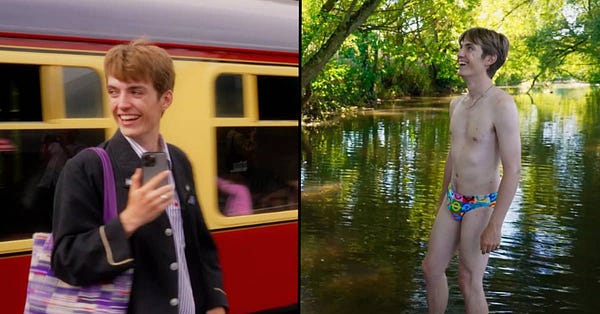Borkowski Weekly Media Trends 14-10-22
Elon Musk's Fielder Gambit | Meta's Leg-acy Issues | C4's Stuntathon | Blonde's Ruthless Ambition
Is Elon Musk’s musk for real? Or has his Nathan for You gambit gone too far?
Good satire fools a segment of its audience into thinking it’s sincere. Great satire is imitated relentlessly and unwittingly in the real world.
As an example of good satire, there is a subsect of meathead city boys who see Martin Scorsese’s Wolf of Wall Street as genuinely aspirational and go out of their way to try to replicate the (fictionalised) excesses it depicts.
As an example of great satire, the parallels between The Thick of It and real UK politics are now so frequent and the similarities so eerie that it’s almost seen as lazy shorthand when used to describe the day’s crisis. At time of writing the following specific Malcolm Tucker quote is trending in relation to the sacking of short-lived Chancellor Kwasi Kwarteng: “The PM is not going to sack you after a week. Sacked after 12 months - looks live you've fucked up. Sacked after a week - looks like [s]he's fucked up.”
For a certain generation the Great Satire category would also include Nathan Fielder’s ingenious evisceration of American entrepreneurship, Nathan for You. And by the measures set out in this trend’s opening paragraph, that status was vindicated this week by one of the world’s most successful businessmen and regular feature of this newsletter Elon Musk.
First he treated the satire with sincerity; seemingly unaware that Nathan for You is a fairly savage parody of his exact breed of business evangelist, Elon Musk is apparently desperate to court a friendship with Fielder, apparently of the opinion that the two are kindred spirits even though Musk takes himself more seriously than perhaps anyone else on Earth (currently genuinely believing himself capable of brokering peace between Ukraine and Russia) and Fielder’s business leadership was a joke for a TV show.
Then life began to imitate art as Musk released a new perfume called Burnt Hair that has reportedly racked up $1M worth in sales despite the fact it apparently stinks. It’s an almost perfectly Fielder-esque ploy by Elon; random, unhinged, a weirdly effective consumer attention grab, reminiscent of Nathan’s infamous ‘poo frogurt’ stunt.
It raises the question; is the whole thing just Musk’s latest gambit to try and befriend Fielder (it would be an equally Fielder-esque move to have an ulterior motive for a flamboyant stunt)? Or, has Musk already succeeded in befriending Canada’s top business guru, and is the absurd perfume in fact the pair’s first collaboration as part of Fielder’s next high concept meta gymnastics? In either case it’s another example of the lines between life and satire blurring.
Meta’s Leg-acy Issues
Anyone with half an eye on Meta and the broader tech sphere will know that the metaverse has a long development journey before mainstream consumers start to take it seriously. 'Metaverse' has crept into the public's lexicon, primarily during lockdown but has failed to establish a foothold in popular culture, despite multiple attempts, which we occasionally cover in our Trends.
But there are sincere attempts by Zuckerberg to turbo-charge excitement with sporadic announcements that tend to be linked to a VR product update or a sneak-peak at the primitive functioning 'Horizon Worlds', Meta's flagship virtual world that has about 300,000 monthly active users.
Zuckerberg appears oblivious to the media's snide sentiment toward the project he's pouring billions into developing. As Zuckerberg sincerely attempts to champion Meta's innovations, the undercurrent of sniggers and jokes kills its credibility.
Until this week's announcement, Meta's avatars and animation are a trip back to 2006 when Nintendo released its groundbreaking Wii. The graphical contrast is uncanny, with floating bodies and heads playing sports like tennis and golf. But then Meta flashed us forward to the early 2010s by introducing legs, adding to the overall realism (we're still missing toes, though).
Meta's tech announcements and progress on its metaverse are so primitive it's challenging to take any part of it seriously.
And whilst cynics flooded social media with memes, Meta issued a follow-up statement, "to enable this preview of what's to come, the segment featured animations created from motion capture." So the video that Meta premiered wasn't authentic; it was marketing wizardry to demo a future where Horizon Worlds users develop the use of their legs.
Zuckerberg is desperately trying to publicise his innovation in this space, primarily to jumpstart Meta's stock price, which has fallen almost 70% from previous highs. But while his employees are constantly airing their scepticism to the press, Zuckerberg's metaverse vision is looking bleak, tarnishing the reputation of the entire space.
Channel 4’s Stuntastic Week
To those outside the UK bubble Channel 4 might seem like a bit of an oddity. Established as a public broadcaster that platforms voices underrepresented by the more establishment BBC, it has evolved into and eccentric mix of respected hard news, edgy and critically lauded comedy and drama, and the most inconsequentially silly reality and light-entertainment Alan Partridge ever deleted from his Dictaphone.
This week Channel 4 has dominated headlines by focussing on the latter element of its output and seizing the initiative from ITV and Channel 5 as the silliest billy in UK television by announcing a series of shows that also function perfectly as publicity stunts.
The first was a show in which an audience decides (presumably with some kind of debate format) whether Jimmy Carr should destroy a painting by Adolf Hitler (and then other subsequent controversial artworks) live on air. The title, the format and everything about the show is the kind of clickbait that feels like it was generated by a pop culture AI Bot and that’s exactly what the media and social networks picked up on, what will probably attract a decent amount of viewers (for the first 10 mins of the first episode at any rate) and, more importantly, reignite the channel’s reputation for anarchic experimentalism that pushes the boundaries of taste.
Then came the announcement that every PR, Marketing and Advertising company’s favourite example of a TikTok-er to use in a pitch (2020-present), Mr. Francis Bourgeois has shaken off his cancellation for failing to support the RMT strikes and landed a celebrity trainspotting show with Channel 4. Depending on whether C4 have missed his peak popularity, and how Bourgeois fairs as a presenter, this could grow into the kind of mindless, feel-good candyfloss telly that actually lasts and connects the ol’ dog of a channel with that illusive younger audience.
Finally, the show that every Tweeter has fantasised about since day one of the scandal: the WAGatha Christie dramatisation is becoming a reality, complete with the ultimate middle-brow stamp of quality: Michael Sheen depicting a real person. Such was the notoriety, media obsession and low-stakes melodrama of the real-life story that Channel 4 will have no problem attracting an audience to that one.
All-in-all, a good week’s work for the channel heads…and their PR team.
Blonde Ambition Exploitation
In 2022, one is never further away than two weeks from a new Hollywood biopic announcement. It seems that barely any original screenplays make it into production these days, and the based-on-real-events craze shows no signs of slowing down. Which is curious, given how delicate an art it is to re-tell stories of much beloved legends, as the backlash against the new Marylin Monroe biopic, ‘Blonde’, shows.
In her first ‘serious’ (arthouse) Hollywood role, Ana de Armas portrays Monroe as a troubled, erratic woman who battled depression – not that any of these descriptions seem unfounded. Marylin’s fanbase got particularly offended by the director’s artistic liberty taken to portray the dead icon’s sex life, including a purported polyamorous relationship and two abortions, which take up a big chunk of the film, and which supposedly scarred her for life.
Some called the film ‘pro-life propaganda’, on the basis that the abortion probably never had happened as Marylin struggled with infertility. The chatter around this production, beyond the most contentious issues, keeps re-stating the age-old question: should we speak ill of the dead? From the PR point of view: why not? But with some caveats.
As Hollywood’s biopic factory reaches out to revive stories of past celebrities from an increasingly forgotten era (Baz Luhrmann’s ‘Elvis’, for instance), the producers could reasonably expect a degree of indifference towards more controversial portrayals. Rita Hayworth’s fandom is probably just not around anymore, and the majority of today’s cinema-goers wouldn’t have an emotional attachment to her story or presumed sanctity. Hence the example of ‘Blonde’ is an interesting one in that it offended so many.
The director Andrew Dominik’s miscalculation was avoidable. He failed to see that Marylin had become an icon of female suffering, not very unlike Amy Winehouse or Whitney Houston. That suffering can be mourned, but fetishizing it on screen – ironically, as the film industry was key to Marylin’s downfall – will be seen as cruel. For intellectual freedom’s sake, it should be possible to bring nuance to a victim narrative. But Marylin’s victimhood rose to represent the collective rather than individual. It is telling that at the end of the day, Marylin’s reputation is doing just fine – Dominik’s, not so much.









